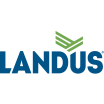
Landus Minnesota Grain Bids
Last updated: Feb 19, 2026 3:46pm MT
Phone number: 1-515-817-2100
Today's Landus Minnesota Grain Bids − February 19, 2026
#2 Yellow Corn
- Feb–Mar: $3.86
#2 Yellow Soybeans
- Feb: $10.73
View the latest Grain Bids from Landus — jump to a specific grain below:
#2 Yellow Corn
#2 Yellow Corn prices in Landus locations:
| Location | Delivery | Cash Price |
|---|---|---|
| Bricelyn Compare prices | USD 3.86 | |
| USD 3.86 |
More about #2 Yellow Corn
#2 Yellow Corn is a grade of corn primarily used in animal feed and industrial applications due to its consistent quality and nutritional profile. This variety is characterized by its bright yellow kernels and uniformity, making it a reliable choice for livestock nutrition, particularly for poultry, cattle, and swine.
#2 Yellow Soybeans
Up-to-Date list of #2 Yellow Soybeans prices in Landus locations:
| Location | Delivery | Cash Price |
|---|---|---|
| Bricelyn Compare prices | USD 10.73 |
More about #2 Yellow Soybeans
#2 Yellow Soybeans are a commonly traded commodity in the agricultural markets. Their classification as #2 grade indicates a high-quality standard with minimal defects, foreign material, and damage. Known for their yellow hue, they are a versatile crop that plays a crucial role in the production of soybean oil, tofu, and other soy-based products. Additionally, they enhance soil fertility and reduce the need for synthetic fertilizers.
About Landus
Landus is a forward-thinking, farmer-owned agricultural cooperative headquartered in Des Moines, Iowa, dedicated to connecting its over 5,500 farmer-owners with global markets through innovative and sustainable solutions. With a business footprint that spans 34 states and 16 countries, Landus leverages its extensive network to support farmers in building resilient and prosperous operations.
Grain marketing and origination are central to Landus’s service offering. The cooperative operates over 50 grain facilities across Iowa, giving producers convenient access to storage, drying, and merchandising services. Landus connects local grain to both domestic processors and global markets, helping farmers maximize returns and diversify their marketing strategies. Producers can work directly with Landus grain marketing advisors to build tailored plans that reflect their individual risk tolerance and financial goals.
Landus also leads the way in agricultural innovation with its emphasis on data-driven decision-making and farmer-focused technology. The cooperative is also a pioneer in carbon and sustainability programs, helping producers document and monetize conservation practices while meeting the growing demand for traceable, environmentally responsible grain. By integrating technology with agronomic expertise, Landus helps modern farmers stay competitive in an evolving industry.
Landus was formed in 2016 through the unification of two long-standing Iowa cooperatives—West Central Cooperative and Farmers Cooperative Company. Both organizations brought with them a deep-rooted legacy of serving farmers throughout the state, dating back nearly a century. The merger created one of the largest agricultural cooperatives in the U.S., enabling broader access to global markets, advanced grain systems, and enhanced operational efficiencies for its members.
Membership with Landus offers numerous benefits, including patronage eligibility, voting rights, and access to exclusive events and educational resources. By investing a one-time fee of $500, agricultural producers in good standing can become members, gaining opportunities to influence the cooperative's direction and participate in its growth. This structure fosters a collaborative environment where members share in the cooperative's success and have a voice in its governance.
Through its commitment to innovation, sustainability, and member empowerment, Landus continues to play a pivotal role in advancing agriculture and supporting the livelihoods of its farmer-owners.
Landus FAQ
What is Landus?
Landus is a farmer-owned agricultural cooperative headquartered in Des Moines, Iowa. It provides grain marketing, agronomy, and sustainability solutions to more than 5,500 member-owners across Iowa and beyond.
How was Landus formed?
Landus was created in 2016 through the merger of two long-standing Iowa cooperatives—West Central Cooperative and Farmers Cooperative Company. The unification formed one of the largest agricultural cooperatives in the U.S.
What services does Landus provide?
Landus offers a wide range of services including grain marketing and storage, agronomy solutions, precision ag support, sustainability programs, and access to domestic and global markets.
How many grain facilities does Landus operate?
Landus operates over 50 grain locations across Iowa, providing storage, merchandising, and logistics support for commodities such as corn and soybeans.
Who can become a member of Landus?
Agricultural producers who do business with Landus and meet cooperative qualifications can become members. A one-time $500 equity investment is required to establish voting membership.
What are the benefits of being a Landus member?
Members enjoy voting rights, potential patronage distributions, invitations to exclusive events, and access to tailored programs and resources designed to support their operations and profitability.
Is membership required to do business with Landus?
No, non-members can still do business with Landus. However, members gain access to additional benefits, governance participation, and profit-sharing through patronage.
Futures Market Data: Futures price data on Farmbucks is provided by DTN, CME Group, and ICE. This data is for informational purposes only and may be subject to delays or inaccuracies. Please consult official exchange sources or your broker for trading decisions.
Questions or Feedback: For any additional information, questions, or feedback, please visit our Contact Us page. We're here to help.